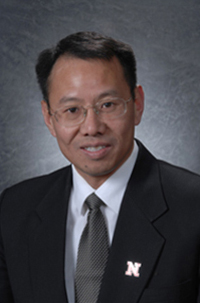
Weixing Li returned to the United States June 23, some 11 days after he had expected to touch down in Alaska to meet his vacationing wife and child. He didn't miss a flight; instead, he spent two weeks detained by authorities in China's Henan Province, about 400 miles southwest of Beijing, the result of what he calls a "personal accident."
Li, an assistant professor of practice in management in the College of Business Administration, had finished leading a successful four-week study-abroad trip to China on June 2. Seventeen students, his graduate assistant and Li had visited several cities in China, including Lhasa, Tibet.
On June 2, seven of those students left China. Of the 10 who remained, two went to Shanghai and the remaining students stayed in Beijing. All were to complete three- to four-week internships arranged by Li. While Li's supervision of the students ended June 2, he remained on hand to help them navigate their first weeks in their positions. He visited relatives in Beijing and planned to return to the United States on June 12.
That changed on June 6 when Li borrowed a vehicle to drive to his late father's hometown, Tangyin, where Li wished to clean his father's grave. This is a ritual performed by sons in China and he had promised his mother he would do so.
But things went awry. Li said the friend from whom he borrowed the car had borrowed it from another friend whom Li did not know. Li was about 15 miles from Tangyin when he encountered a routine police checkpoint. Officials found in the trunk a medical kit that contained pharmaceuticals that required a special license, which Li did not have.
After much discussion, the authorities took Li to a facility about 90 minutes away; they took his watch, passport, personal papers and cell phone as they began an investigation. He was fingerprinted. He said he was not mistreated but it was clear he could not leave the facility.
"I was not free," he said. "I cannot just walk out."
Li said he was always watched, and the three times he was allowed to call his sister, and the two times he called his wife, he had to write a script that the authorities approved. He was not allowed to tell them he was detained because authorities told him that his family would interfere in the investigation. His name was not placed on an official detention or arrest list, which would have helped his family learn of his whereabouts. He believes that the fact he was in a rural area where the laws are followed only vaguely and communications are difficult contributed to the situation.
When the authorities learned the car's owner had the documentation that allowed him to legally transport the medical materials, the authorities then focused on Li's background. After some time, they simply let him go.
"They told me my story checked out and that I could go," he said.
Li said he was in their custody, not under arrest, from about 6 p.m. June 6 until about 9 a.m. June 20. He continued his journey to sweep his father's grave, and returned to Beijing. He flew to Nebraska on June 23.
"I never worried that I wouldn't get out because I know I am not a bad guy," Li said in an interview on June 25. He did worry about his family and his students, whom he knew were probably trying to contact him.
Li has led similar study-abroad trips to China for the five years he has been associated with UNL. He has lived in the U.S. for 12 years and has a "green card" giving him lawful permanent resident status. He visits China twice a year.
"What happened to me, at no time were UNL students under any threat or in danger. They may have been worried about me, but their safety was not in danger," Li said. "What happened to me had nothing to do with UNL or the study abroad program."
David Wilson, UNL's senior international officer, said the university community is relieved that Li has returned safely.
"We remain committed to study-abroad, China, and faculty and student safety. There are few better tools than study abroad to help students understand the world and its people in all of their variety," Wilson said.
— Kim Hachiya, University Communications